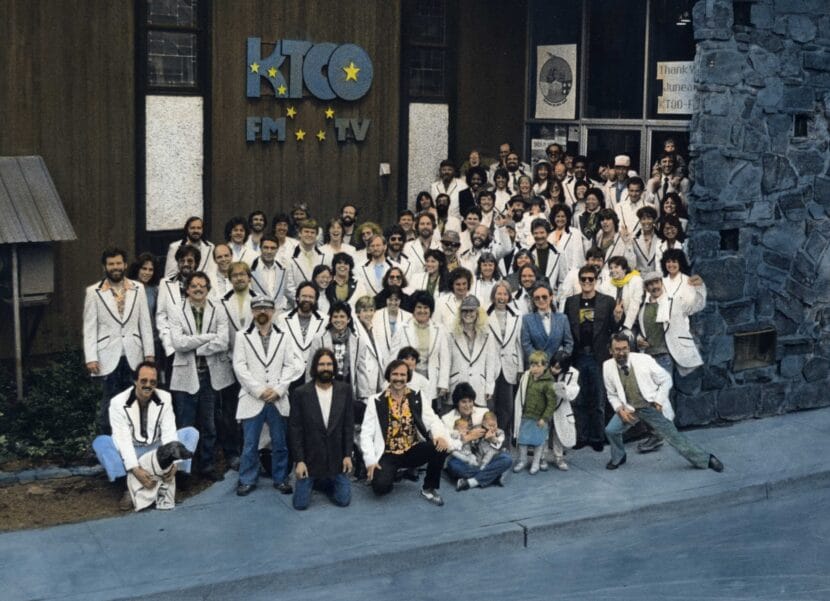Editor’s note: For our 50th anniversary we decided to step back and highlight a few of the people who helped get us started. Engagement Editor Adelyn Baxter spoke to founders and other people who had a role in making KTOO what it is today.
Juneau’s locally owned, listener-supported public radio station is 50 years old this week. A lot has changed after five decades on the air — KTOO now boasts three radio stations, a television channel, a website and a staff of more than 20 people.
But like most community radio stations, it had humble beginnings.
“You’re listening to KTOO, stereo FM radio for Juneau, Alaska,” says John Corso, one of the founders of KTOO, during a radio spot that ran in early 1974. “KTOO is owned by the people who listen to it, and operated by the people who own it. You’re a listener right now. You can become an owner by joining Capital Community Broadcasting. And you can become an operator by volunteering your time.”
The spot ends on an irreverent note that’s characteristic of the station’s early days.
“If you’d like to know more about owning and operating, keep listening. If you’d like to know more about listening, see an audiologist.”
Fifty years later, in the KTOO archives, former general manager Bill Legere examined dusty boxes of photos and documents. He pulled out a booklet called “How to KTOO,” written by Elaine Mitchell.
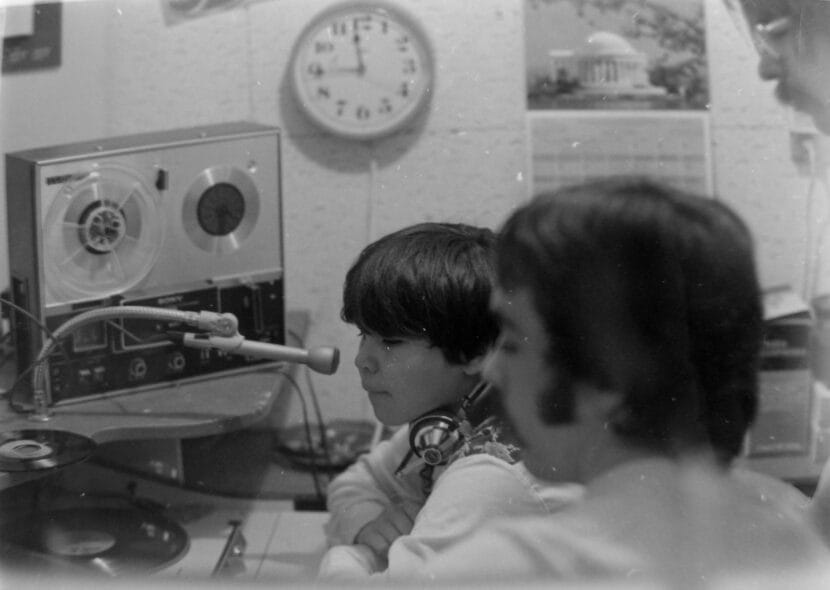
Mitchell was a champion of Alaska radio. She died years ago, but she went on from KTOO to help found the Alaska Public Radio Network, which still connects dozens of rural and urban stations today. Legere called her “the founding mother of KTOO.”
“There’s this line in here that says, ‘You’ll never need more than $10,000 a year to run the radio station,’” he said. “So, sort of quaint in that regard, but it was the blueprint for how to start a public radio station.”
KTOO wasn’t the first public radio station in Alaska, but it was one of them. To understand its scrappy beginnings, we need to go back to the early 70s, when Juneau had just two AM commercial radio stations.
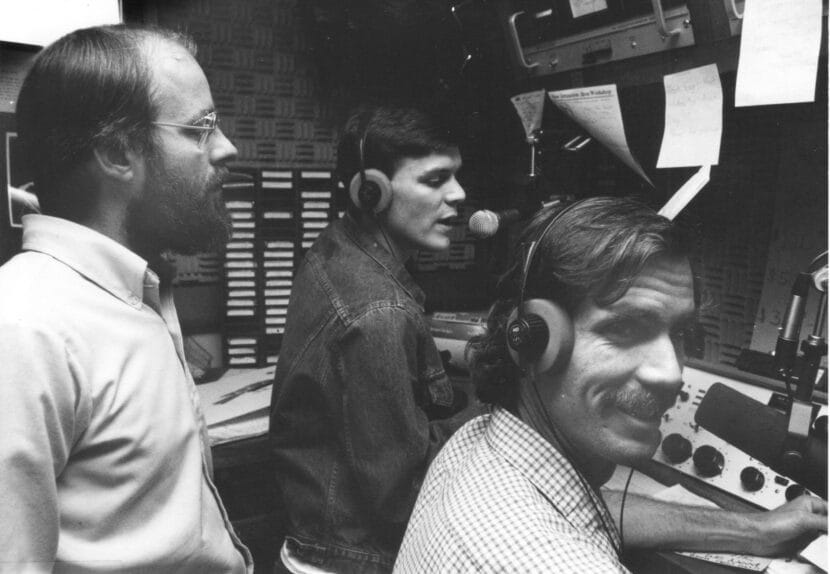
As Dennis Harris recalls, neither one was locally owned. He and other staff at one of the stations got fired abruptly one day — which wasn’t unusual. They often got hired back. But it was tedious. And this time, his colleague, Mitchell, had an idea.
“Elaine had bought this book called ‘How to Start a Community Radio Station,’ where they recommend that you build a 10-watt station because it was cheap,” Harris said. “And she passed it around to us, and we talked about it. And we had a meeting. And we decided to start a nonprofit corporation.”
Harris, Mitchell and a small group of determined volunteers began to get the word out that they were starting a community-focused radio station.
“We were able to raise the money necessary to build the station in about two months, just from donations,” Harris said.
In the early 70s, public radio was in its infancy across the country. The Public Broadcasting Act of 1967 created the Corporation for Public Broadcasting, which distributes federal money to public media stations across the country as a portion of their funding. NPR was incorporated in 1971, along with 88 founding member stations.
Meanwhile, national community radio trailblazer Lorenzo Milam wrote “Sex and Broadcasting: A Handbook on Starting a Radio Station for the Community” – the same book that inspired Mitchell and scores of other stations around the country.
It took more than a year to get the equipment and FCC license necessary to get on the air. They found space for two radio booths in Juneau-Douglas High School: Yadaa.at Kalé’s auditorium. They were tiny, but they worked.
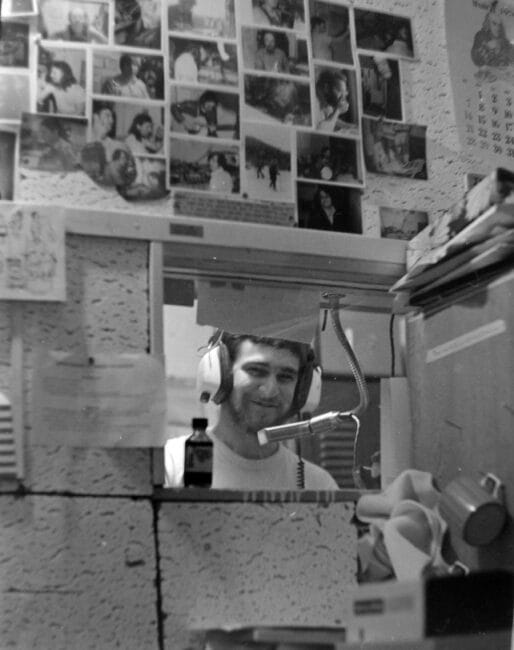
“Having a locally owned, locally controlled radio station was part of the big impetus,” Harris said. “And the other was to have a place where we could have an open microphone where the community could come and say anything they wanted, as long as they didn’t libel or slander anybody.”
The first official broadcast was sometime around midnight between Jan. 26 and 27, 1974 — or maybe earlier, depending on who you ask. It was a bit chaotic, according to the remaining founders. But either way, Frederick Hoskinson’s voice was the first to go out over the airwaves.
“I was hired as the first coordinator of volunteers, which we only had that one position,” Hoskinson said. “Everyone else was a volunteer.”
There were more than 100 volunteers in the early days. They didn’t broadcast all day long — Hoskinson said they would start around 12:30 p.m. People could host shows on just about any topic and played any kind of music they wanted. He remembers a Saturday program hosted by middle school students aimed at kids their own age.
“There was no way that we can be everything to everybody all at the same time,” he said. “We tried to be everything to everybody at various different times.”
Part of the station’s early focus revolved around legislative coverage. Mitchell and Harris hosted a legislative digest that aired in the evenings and was available to public radio stations statewide.
Betsy Brenneman came to work at the station in 1978 from KYUK in Bethel.
“It was a real hub for the community. I mean, there were people coming in and out of the station,” she said. “People would just come in and hang out and talk.”
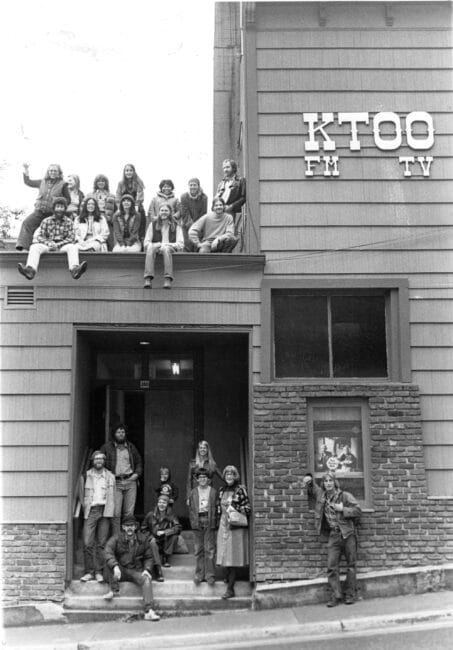
KTOO later moved to two other buildings downtown before finding its current home at 360 Egan Drive in 1996. A television station — now called 360TV — went on air in ‘78, with Brenneman in charge.
“(We) just found a lot of people who came together and made things happen that, in some ways, if you look back — ‘Oh, how did we do that?’ You know? But, we did it,” she said.
Legere didn’t arrive at KTOO until the 80s, and took the helm in 1991, but he said the same spirit that started the station persisted even then.
“KTOO started in a time when there was no one to say ‘no.’ You could do anything you wanted, as long as you could figure out how to do it,” Legere said.
There are more people than we could ever hope to mention in this story who helped build KTOO and kept it going for half a century.
Today, as in 1974, KTOO remains locally owned and operated.
KTOO’s Tasha Elizarde and Bostin Christopher contributed to this story.
If you have a memory you’d like to share for KTOO’s 50th anniversary, you can find out how to submit it here.

